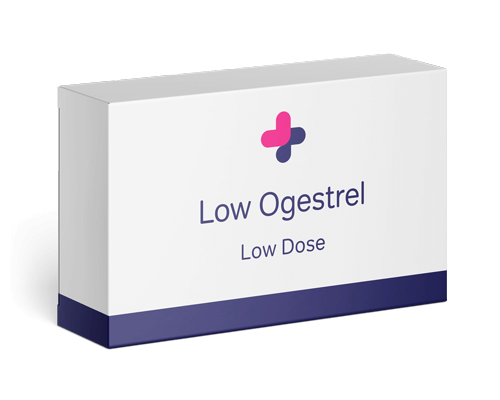Low Ogestrel side effects
As with all medications, Low Ogestrel has several associated side effects. However, compared to birth control pills with a higher dose of estrogen, you can expect to experience less estrogen-related side effects.
Common side effects of Low Ogestrel include:
-
Nausea and vomiting
-
Headaches
-
Feeling bloated
-
Breast tenderness or soreness
-
Swelling of the ankles or feet
-
Weight changes
-
Irregular periods or spotting (light bleeding between periods) - this is more common when you first start taking the pill.
If you experience any of the following serious side effects you should stop taking Low Ogestrel and speak to your doctor as soon as possible:
-
Lumps in the breast
-
Mood changes, including symptoms of depression or worsening of an existing mental health problem.
-
Severe abdominal pain
-
Dark urine
-
Jaundice (yellowing of eyes or skin)
-
Continuous spotting that doesn’t resolve within the first month
-
Sudden heavy bleeding
-
Missed periods
It is also possible to experience a severe allergic reaction to Low Ogestrel. If you experience any of the following symptoms you should seek emergency medical attention:
As with all medications, there are risks you should be aware of. Low Ogestrel can cause dangerous side effects related to blood clots. These include strokes, heart attacks, pulmonary embolisms and others. Therefore, you should seek immediate medical attention if you experience any of the following symptoms:
-
Pain in your chest, jaw or left arm
-
Weakness on one side of your body
-
Shortness of breath or rapid breathing
-
Sudden dizziness or fainting
-
Confusion
-
Slurred speech
-
Severe headaches
-
Migraines
-
Headaches with vision changes or a lack of coordination
-
Unusual levels of sweating
-
Vision changes including double vision, visual impairments and blindness.
Contraindications and Precautions
Do NOT take Low Ogestrel if:
- You are or think you could be pregnant, think or plan to become pregnant soon
- You have a history of stroke or previously had a heart attack
- You have blood clots in the legs (thrombophlebitis), lungs (pulmonary embolism), brain (stroke) or eyes
- You previously had blood clots in the deep veins of your legs
- You have chest pain (angina pectoris)
- You have known or suspected breast cancer or cancer of the vagina, cervix or uterus lining
- You have unexplained vaginal bleeding
- You had jaundice (yellowing of the skin or whites of the eyes) during pregnancy or when using other contraceptive medication
- You have a liver tumor (benign or cancerous)
Make sure you tell your doctor if you have any of the following:
- You have fibrocystic disease of the breast, breast nodules, or had an abnormal breast x-ray or mammogram
- You have diabetes
- You have high cholesterol or elevated triglycerides
- You have high blood pressure
- You have migraines or other headaches
- You have epilepsy
- You have depression
- You have gallbladder, heart or kidney disease
- You have a history of irregular menstrual periods
- You smoke. It is strongly advised that you do NOT smoke when taking oral contraceptives.
Drug interactions
Before you begin to take Low Ogestrel, let your doctor know about any other medications you take (purchased with or without a prescription). The following drugs are known to disrupt the performance of Low Ogestrel:
- Rifampin
- Epilepsy medications, including barbiturates such as phenobarbital and phenytoin
- Phenylbutazone
Antibiotics can decrease the effectiveness of oral contraceptives. A backup contraceptive method, such as condoms, should be used if you are taking antibiotics.

















Quick and discreet
I ordered Azithromycin tablets for chlamydia treatment, received it next day in a brown discreet pack, and cheaper than all other pharmacies, can't ask for more
Jordan McCann